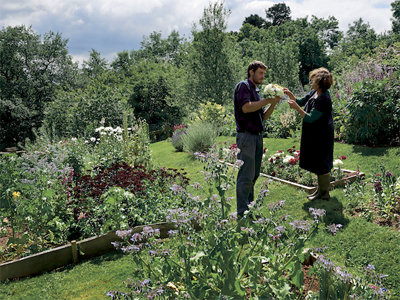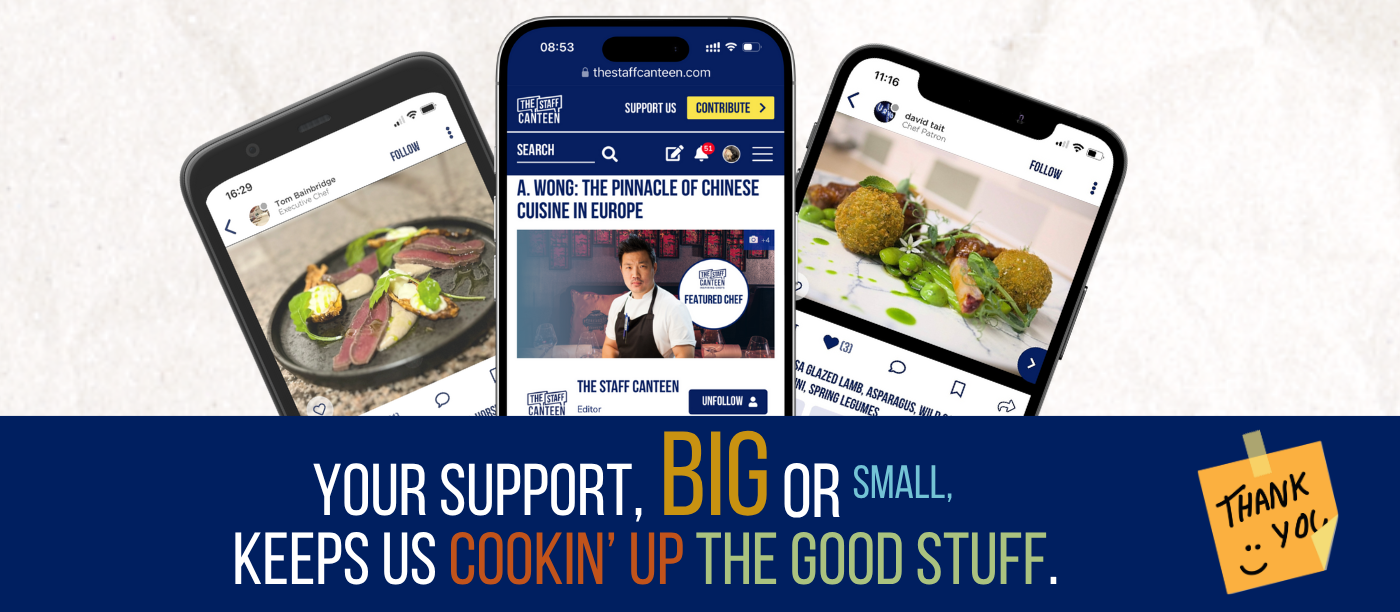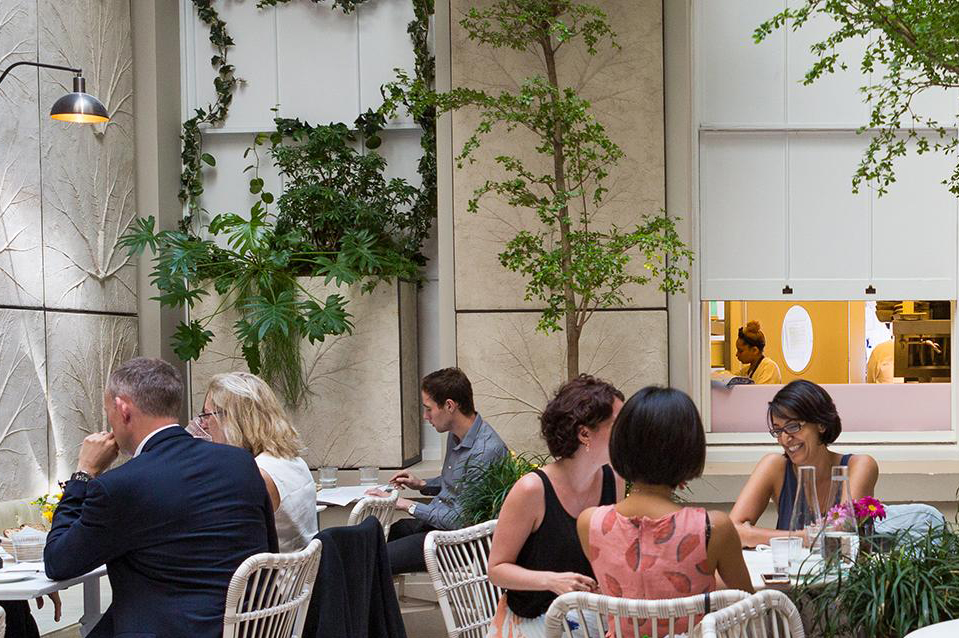Skye Gyngell on how helping the environment can put bums on seats

Skye Gyngell is a force to be reckoned with. Forty years after setting foot into Paris' top kitchens, she's at the top of her game.
Her restaurant, Spring, once again featured in the top 100 National Restaurant Awards list this year and she was recently named Female Chef of the Year by SquareMeal.
Resting on her laurels isn't something she would consider; and yet, conscious that she is probably in the last third of her career, she believes that now is the time to consider her legacy.
"What's important to me is to leave the industry - whenever that is - when I can actually look at myself and go, you know what, I contributed positively."
"When I was younger it was much more about me, but I don't feel that anymore. I feel that I'm not as fast and quick and often talented as a lot of the young chefs, but I think my value is experience."
"And also, I don't really care what people say about me anymore. I don't mind making a fool of myself and trying to do things that people will say are impossible."
Get rid of single-use plastic and reduce your overheads
One such effort was to eliminate all single-use plastics from the restaurant in a year. The chef set the aim in January 2018, achieving it in three months.
While it came at a cost, she said, involving "a lot of hard work, ingenuity," and £1,700, "a lot of it was doing the maths and making sense with certain things."
They switched loo-roll providers to someone who didn't send it wrapped in plastic, and got lids for pots, pans and gastros, allowing them to stop using cling-film.
"I do understand that it's not easy to make money in our industry and the idea of spending £2,000 to make change seems really expensive but the thing is, we don't buy any clingfilm anymore, so we've already saved money."
Doing good is a talking point

that supplies most of the fresh produce at Spring
And this is very much what is commendable about Skye's work: it's all well and good wanting to save the planet, but it only works if you can still hold up a profitable business.
"All the things that we've done are in a way good marketing tools," she explained.
"Being the first restaurant in the UK to be single-use plastic free is good, it's a talking point. As well as helping the environment, it helps us."
The restaurant's food waste reduction strategy is equally business-savy, mainly executed with the Scratch menu.
Served daily between 5:30 and 6:30pm it relies on ingredients that would otherwise go in the bin, and has helped reduce waste from 30 percent to about 4.
"It's fun, it gets people through the door early so it gives a beautiful atmosphere in the room. It doesn't earn us a great deal of money, but you've also got to remember we haven't got a food cost on there - we have really nice food costs at the end of the month because of it."
The weight of change shouldn't rest on chefs' shoulders alone...
Skye's efforts aren't slight, nor is she convinced that she can reform the world's food system on her own, but equally, she sees it as a matter that can't be ignored.
"I think we're the third biggest business in the world - I think it's crude oil, then fashion, then food - in terms of damage to the environment."
She agrees that to an extent, restaurants like hers have a voice, and that "it would be morally wrong not to use that voice when it's so obvious the broken system that we're working within."
...But there are things chefs can do to help
Feelings of hopelessness and powerlessness are understandable, especially for time-poor (or poor, full stop chefs and restaurateurs).
But contributions don't need to be to demanding: buying certified organic produce (or uncertified but grown in healthy soil), being mindful of food waste, pressuring your suppliers into reducing the amount of plastic they use and working seasonally are but a few ways of reducing your restaurant's impact on the environment, she explained.
Another important thing to bear in mind is to step away from industrially-conceived trends: even the most well intentioned ones, like veganism.
"Food has got so many emotional attachments

to it which it didn't used to have - it's good, it's bad, there is no superfood, fats are good for you, good clean dairy is good for you.
"If I put any huge demand on the soil for one crop, it's going to deplete the soil. That goes for avocados, chia seeds, almonds, it's creating huge water shortages in a lot of countries. You can eat fruit and vegetables but you're not stepping out of the mass spraying, the chemical use, the monocultures that have developed."
"Animals, just like vegetables, shouldn't be demonised, they're an essential part of a healthy farm life, they have a place in our environment. It's not demonising animals, dairy or nut milks, it's just about having everything in proportion and I really think that we've been suckers to big business."
"I think it's really messed up our heads around food. I think we all know what we should eat - Michael Pollan says it brilliantly: 'Eat food, not too much, mostly plants.'"

IS INDUSTRIAL FOOD PRODUCTION to blame for dietaries?
Equally, for Skye - who doesn't accept dietary requirements for customers ordering the Scratch menu, but concedes that "if you're a vegetarian, if you're dairy free, I haven't got to the stage where I'm going to scream at you and say you can't come into the restaurant" - big industry is in many respects responsible for the rise in dietaries and allergies.
"I've been around long enough to remember when there weren't dietaries, and also there weren't the allergies that there are now," she said.
"It's not the food itself. Gluten is an incredibly good thing."
"Milk's not really good for you anymore and I think it's probably because all of the hormones and what goes into the feed of the animals comes out through their milk - it's just all messed up and people are blaming the ingredient as opposed to the method. I think the method is the issue."
What's next?
Looking to the future, Skye isn't planning on slowing her efforts to make Spring a better business - she will push on with efforts to reduce waste and move towards more of a circular economy, and look at the improvement of staff welfare, too: as well as more training, Skye is hoping to introduce yoga and meditation classes to address mental health issues in the industry.
Let it be said: Michelin stars aren't a curse
Not wanting to open up old wounds, Skye's decision to leave Petersham Nurseries after it won a Michelin star was a memorable moment for the industry, and a difficult subject to avoid. But were her words taken out of context?
"That definitely was misconstrued," she said.
"I have to take responsibility for that, I talked to a journalist and it was in a much bigger conversation and then you get the headline."
Having trained in Paris at the time of the great French chefs - the Troisgros brothers, Roger Verger, Paul Bocuse, Michel Garatt, she said that if someone had told her that she'd get a Michelin star one day, "it would be like telling an eleven year-old girl they would be a princess when they grow up."
"It was a huge honour, I was incredibly thrilled, I was so proud of the team, it was against all odds: we had a dirt floor, we cooked from a garden shed and so I was thrilled."
What was most challenging, she explained, was that expectations had changed.
"That's what was painful - because all of a sudden it felt like everything you'd done and the reasons you'd done it for, it felt like people weren't understanding it and were criticising it."
"People used to come and say: 'call yourself a Michelin-starred restaurant' and you go: 'no, no, we didn't, we were given the award and we were thrilled.'"
Does she think it would be different if Michelin gave the accolade to Spring?
"Yes, I'd be thrilled for everybody here if they got a Michelin star, I think it's probably very good for business, but do I obsess about 50 Best or Michelin or an award to be the best female chef? No."
"It's a moving target. I just think it would be a vice that you had yourself in."

For 17 years, The Staff Canteen has been the meeting place for chefs and hospitality professionals—your stories, your skills, your space.
Every recipe, every video, every news update exists because this community makes it possible.
We’ll never hide content behind a paywall, but we need your help to keep it free.
If The Staff Canteen has inspired you, informed you, or simply made you smile, chip in £3—less than a coffee—to keep this space thriving.
Together, we keep the industry connected. Together, we move forward.














